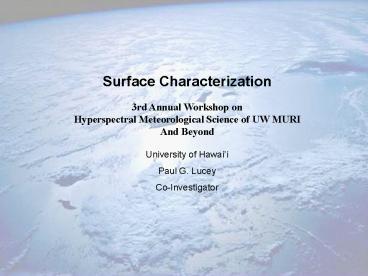Surface Characterization
1 / 14
Title:
Surface Characterization
Description:
Use multispectral infrared satellite data as base map ... Produce mosaic of simulation area. MODIS Base Map. MODIS Base Map Mosaic ... –
Number of Views:27
Avg rating:3.0/5.0
Title: Surface Characterization
1
Surface Characterization 3rd Annual Workshop on
Hyperspectral Meteorological Science of UW MURI
And Beyond University of Hawaii Paul G.
Lucey Co-Investigator
2
Hawaii Contributions To Wisconsin MURI Project
3
- Surface Emissivity Simulation
- Use multispectral infrared satellite data as
base map - Fit infrared multispectral data with
hyperspectral library data - Produce continuous sampled spectrum at each
pixel
4
- Base Map
- Data from MODIS
- Convert to emissivity
- Detect and eliminate clouds
- Produce mosaic of simulation area
5
- MODIS Base Map
6
- MODIS Base Map Mosaic
7
- MODIS features several bands with weak
atmospheric extinction appropriate for surface
characterization
8
- MODIS surface bands constrain surface
compositional types
9
Estimate of MODIS surface emissivity MODTRAN
coupled with aerosonde measurements provides
atmospheric transmission, up and downwelling
radiance. Assume no multiple scattering LsatLat
m_upwellingB(T)eL atm_downwelling(1-
e)tatm At 11 microns assume e1 to establish
surface temperature Solve for e at all
wavelengths
10
Cloud Detection and Removal
- High visible radiance
- Low infrared radiance
- Change detection
- Mask detections, average emissivities of
non-cloudy areas - Residual clouds set to blackbody radiances at
mean surface temperature
11
Emissivity assignment
- Extract soil emissivities at MODIS wavelengths
(assumine Kirchoffs Law) from ASTER spectrum
library (41 soils) - Treat ASTER soils as lookup table
- Compare each MODIS spectrum to lookup table and
return soil sample for closest fit (by RMS
differences) - Insert full resolution ASTER spectrum at each
location
12
Emissivity assignment
13
- MODIS Emissivity Type Map
Spatial resolution 1km Wavelength
range 685-2250 cm-1 Wavelength sampling 2
cm-1 Spectral channels 801
14
Simulation Improvements for Following Year
- Dynamic emissivity
- Vegetation senescence
- Surface moisture
- Ground truth using data from ASTER































